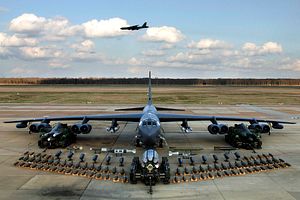Last Thursday Russian President Vladimir Putin oversaw a large-scale nuclear drill involving all three legs of the Russian nuclear triad. This week, the U.S. Strategic Command is following suit.
According to Russian media reports, “During the drills, it was demonstrated how the missile corps, artillery, aviation and anti-aircraft defenses can be used – for instance, to destroy troops on the ground or to counter massive missile, aviation or nuclear strikes by an enemy. Plus, it was shown how to inflict a launch-through-attack strike with nuclear missiles.”
The drill consisted of a ground-based missile launch, submarine-based missile launches, and air-based missile launches. The ground-based portion of the drill consisted of the launching of a Topol intercontinental ballistic (ICBM) at the Plesetsk launch facility in northwest Russia. The reports also said that two submarines that are assigned to Russia’s Pacific and Northern fleets test-fired long-range ballistic missiles. Finally, Tu-95 strategic bombers fired off air-to-surface missiles from an undisclosed location in western Russia.
The drills also had an anti-ballistic missile component. A Russian Defense Ministry official told local media outlets: “At the Priozersk training area (Kazakhstan), a successful interception of a ballistic target by a short-range countermissile was carried out. A massive rocket nuclear strike was repelled by a ballistic missile defense unit of air and missile defense troops.”
Russia previously carried out a massive drill simulating a nuclear attack back in March. As The Diplomat reported at the time:
“Russia’s Strategic Missile Forces began a massive three-day exercise involving 10,000 soldiers and 1,000 pieces of equipment from more than 30 units. The major purpose of the drill, according to the report — which cites multiple senior Russian military officers — is to ensure Russia’s Strategic Missile Forces have sufficient readiness to conduct offensive operations involving the massive and simultaneous use of nuclear missiles.”
Before the start of this week’s exercises, Russian President Putin said, “Today’s planned exercises will involve all of the armed forces across Russia, including our nuclear deterrent.” He went on to stress that the military drills had been planned back in November, implying that they weren’t related to the ongoing crisis in the Ukraine.
The drill took place a day ahead of Russia’s massive May Day celebrations commemorating Moscow’s victory over Nazi Germany in WWII.
Along with Putin, the presidents from Belarus, Armenia, Tajikistan and Kyrgyzstan were on hand to witness the drill. All four states, along with Russia, are members of the Commonwealth of Independent States.
A Putin press secretary had described their visits as follows: “There will be a general exchange of opinion and separate bilateral meetings. Bilateral relations and collective security issues will be discussed first and foremost. One can say with certainty that the leaders will discuss Ukraine by all means.”
On Sunday, U.S. Strategic Command announced that it will be conducting a large nuclear drill this week from May 12-16. According to a press release, the Exercise Global Lightning 14 drill will include “bomber wings that will fly approximately 10 B-52 Stratofortresses and up to six B-2 Spirit bombers to demonstrate flexibility and responsiveness in the training scenarios throughout the continental U.S.”
The press release said that the drill had been planned for more than a year and was unrelated to real world events.
Adm. Cecil Haney, the commander of the U.S. Strategic Command, said of the drills:
“This exercise provides unique training opportunities to incorporate the most current technology and techniques in support of our mission. Continued focus and investment in our strategic capabilities allow USSTRATCOM to deter, dissuade, and defeat current and future threats to the U.S. and our allies.”

































